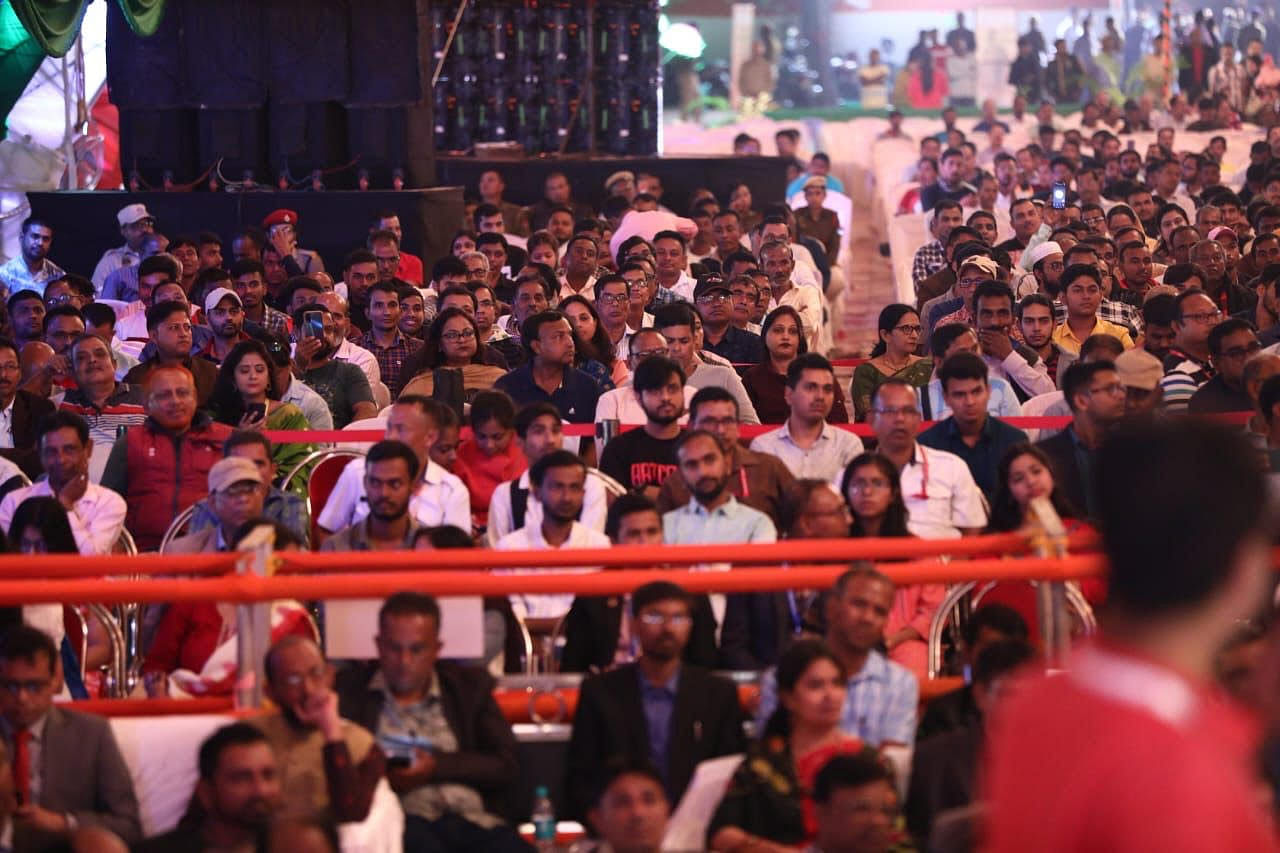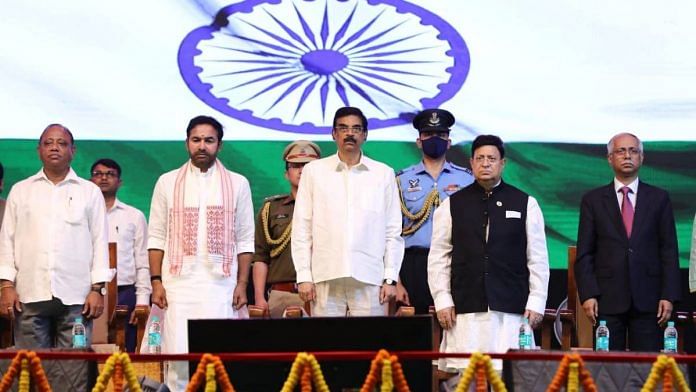Silchar (Assam): “Only Sylhet (in present day Bangladesh) and Assam know how to cook maaser khatta or maasor tenga (sour fish curry cooked in tomatoes or tamarind),” claimed 86-year-old Juned Ahmed Choudhury, recalling childhood memories in the undivided Assam province.
According to him, “people with love in their hearts cannot be divided”.
Choudhury is among 116 Bangladeshis who have crossed over to India by road in the past few days to attend the Sylhet-Silchar festival. The two-day event concluding Saturday, in Assam’s Cachar district, hosted by the India Foundation, under the aegis of the Union Ministry of Culture in association with the Bangladesh Foundation for Regional Studies, to celebrate 75 years of India’s Independence and 51 years of Bangladesh’s liberation from Pakistan.
A large Bangladeshi delegation led by the neighbouring country’s Foreign Minister A.K. Abdul Momen crossed the Shewla land port at the Sylhet border to enter India and was warmly received at the Sutarkandi Integrated Check Post (ICP), about 15 km from Karimganj district by Indian authorities. The team of visiting Bangladeshis comprises five parliamentarians, members of trade bodies, academicians and artists.
“Getting introduced to our guests from Bangladesh is like meeting friends from an ‘old boys’ club’ — we are like alumni of the association,” said Assam member of Parliament (MP) Dr Rajdeep Roy, a key member of the organising committee, who also proudly recalled his grandfather’s contribution as member of the Sylhet municipality for 22 years.
“Together with India, Bangladesh is growing by leaps and bounds. Trade and commerce is the buzzword for our future growth. We should not restrict ourselves to man-made borders,” Dr Roy added, while speaking at the event.
Also read: Sheikh Hasina’s Teesta water calls turn desperate. But Modi is weighing national interest
Bonding over food and music
People from both sides of the border appear to have far more in common than language, traditions and their fondness for fish.
Former Bangladesh Foreign Secretary, Bir Bikram Shamsher M. Chowdhury had brought with him three Bangladeshi chefs to cook traditional Sylheti cuisine at the venue Saturday. Among other preparations, visitors can relish the Mutton Shatkora, a tangy dish cooked with shatkora (Bangladeshi citrus fruit) and flavoured spices.
A veteran of the 1971 liberation war, or Muktijuddho, Shamsher recalled meeting legendary Assamese singer-composer, late Dr Bhupen Hazarika, after the liberation of Bangladesh.
“I was wounded in the war and taken to East Germany for medical treatment. Dr Bhupen Hazarika, who happened to be there, came to my room and sang his composition — ‘Joy Joy Nobojato Bangladesh, Joy Joy Mukti Bahini’ (salutations to newly-born Bangladesh, salutations to the freedom fighters). I wish I could record that moment,” he said.

Shamsher also narrated how he drew inspiration from Indian freedom fighter, Netaji Subhash Chandra Bose, when he participated in the Bangladesh Liberation War at the age of 22.
“There can never be another Subhash Chandra Bose. He believed in the strength of the people beyond religious divide. Two Bengalis who will always inspire are Netaji and Bangabandhu Sheikh Mujibur Rahman, the first President of Bangladesh,” said Shamsher.
Zafir Setu, a professor at the Shahjalal University of Science and Technology in Sylhet recalled the poetry of Shaktipada Brahmachari, and the writings of Barak Valley veteran journalist, Atin Das, which reflect on the pain of partition, the loss of home, and the rupture of ties between family and friends. “The pain of partition can never be forgotten. Some have taken it to their graves,” said Setu.
Call for connectivity and digitisation
The Indian High Commission in Bangladesh issues more than one million visas annually, amongst the highest numbers issued by Indian missions globally. Most of these are tourist visas, and the majority of visitors enter India through the land border.
But a few visitors from Bangladesh at the event complained about the complicated immigration and customs clearance processes, and wished for a better working environment and digitisation at the ICPs.
Juned Choudhury said he had flown from Dhaka to Sylhet, and hired a taxi till the Sutarkandi border, paying Rs 7,500 for a single trip.
“Hundreds have crossed over for the festival. Three of us came a day earlier, fearing rush and to find time to meet our friends here. It took two hours to complete immigration formalities at the ICP. The process needs to be simplified,” said Juned, bitterly mentioning that the immigration officer at the checkpost threatened they would be “turned back”, if found to be travelling without a hotel booking in Assam.
A retired employee of Bangladesh Gas Fields Company Limited, formerly known as Shell Oil Company in East Pakistan, Choudhury was born in a village about 20 miles from Sutarkandi. He proudly identified himself as an ‘Edmundian’, having studied in St. Edmund’s School in Shillong till the fifth standard, the year India was partitioned.
“We had to leave, because we are Muslims from Sylhet. We went back to our village and I completed my studies there. From 1936 till December 1947, I have the fondest memories of my time in Assam. I still keep in touch with two of my school mates, one of whom is from Jorhat town,” he said.
Another visitor, U.S.M. Saifullah, a retired government servant in Bangladesh, said he had travelled from Zakiganj sub-district in Sylhet to Karimganj (in Assam) by road, while also crossing the Barak river by boat.
“The landscape looked beautiful as we gently sailed through. It feels nice to be here, a rare opportunity,” said Saifullah, who had participated in the 1971 war, and is also a member of the Bangladesh-India Friendship Society in his country.
Both Saifullah and Juned shared their love for chunga pura or sticky rice cooked in bamboo, a delicacy in both regions.
“The bamboo in this area and the sticky rice is of superior quality. I have relatives at a village called Malua near Badarpur in Karimganj district. In the ’90s, I used to visit India every year, only to have Chunga Pura,” said Juned.
Discussing trade, rivers and climate
The event included a series of panel discussions presided by experts and policy makers on issues of mutual growth and opportunities.
Bangladesh Minister Abdul Momen and Assam Transport Minister Parimal Suklabaidya shared that both countries are working towards restoring bus and flight services between India and Dhaka, including the introduction of direct flights between Sylhet and Guwahati.
“Such events should be held annually in different parts of Northeast India bordering Bangladesh. Trade and investment is growing in India, a number of companies from Bangladesh have set up offices in Guwahati, but we need to ensure seamless rail, road, air and riverine connectivity,” said Shamsher Choudhury.
Roy stressed on the need to preserve and protect the natural ecosystems for future generations, calling for a concerted approach to protect the Meghna river basin, shared by Bangladesh and India.
The basin includes 29 transboundary rivers originating in India and flowing southward through Bangladesh, before falling into the Bay of Bengal. People living around the Meghna river basin also include the Garo, Khasi and Jaintia communities.
(Edited by Poulomi Banerjee)
Also read: ‘Nobody a minority’ in Bangladesh says minister Hasan Mahmud, thanks India for regional stability



